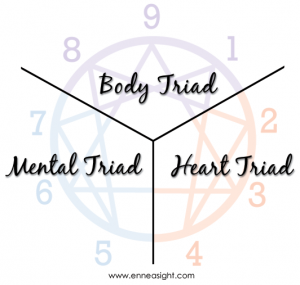
The Enneagram is a dynamic system describing nine personality types with distinctive motivations and perspectives. Although we are each unique individuals, we share common human needs and have developed strategies to get our needs met. The nine types orient around these survival strategies and help us to navigate our relationships, our inner worlds and our shared world. The Enneagram types differ based on their primary motivation and this is what you need to be curious about in discovering your type. The types are organized in three triads which represent three centers of intelligence (body, heart and mind). These three triads orient generally toward attempting to fill one of the three primary needs (worth, approval, and security).
The types related to the Heart Triad (2, 3, 4) are motivated primarily to fill the need for approval, love, or connection and the image needed to attract those things.
Type Two, The Giver:
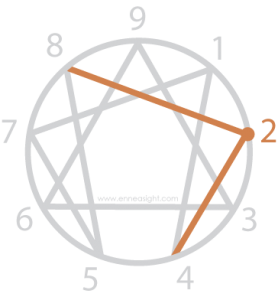
The Giver’s attention is like radar that’s turned towards important people’s needs and feelings with the hope that they feel loved through giving to the other. Their inner voice may say, “surely, if I take care of you and help you, potentiate you, you will find me indispensable, love me and never reject me. You will take care of me and my needs.” The Two will often be unaware that they are giving to get, feeling altruistic sometimes to the point of martyrdom. They can be pridefulin their belief that they know what is best for another, while their own needs are usually hidden from awareness. It can often feel like others are simply not paying attention, are selfish, or not being as loving as they are.
Psychological Health: manifests kindness and generosity to self as well as others, allowing themselves to receive as well as give.
Spiritual Evolution: able to align with the intelligence and will of the universe, a bigger will than their own, finding true freedom and humility.
Relationships: able to grow through the challenge of relationships and transforming the desire to merely please to authentically communicating their feelings and needs while also potentiating their partner’s growth.
Type Three, The Performer:
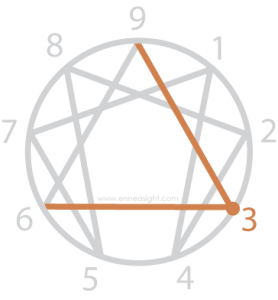
The Performer’s attention is guided by getting approval through a job well done. Oriented to tasks and goals, Three’s are motivated by the desire for success and the avoidance of failure. They will shift their persona and presentation based on what they believe others want to see or hear, ever able to embody the winning image. Although they are a heart type, their feelings are often hidden or suspended, speed bumps on the super-highway of accomplishment. They deceive themselves and others by presenting an image of who they think they should be, thinking that is who they are, and hiding their true feelings in the process.
Psychological Health: manifests gentleness and honesty in relating to themselves and others, and able to work with others so everyone wins.
Spiritual Evolution: able to creatively participate in the natural unfolding of manifestation and play well with others.
Relationships: able to move to doing relationship from the “outside in” to the “inside out.” That is rather than performing the role of an intimate partner they become one by sharing their true feelings. Great cheerleaders for those they care about.
Type Four, The Romantic:
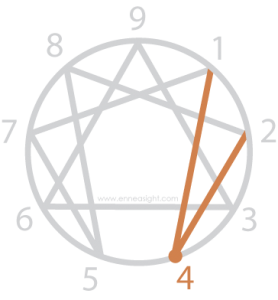 The Romantic’s attention is pulled toward the longed for ideal. Be it the ideal partner, piece of art, or career, they often feel like what’s in front of them just doesn’t quite make the mark. The Four feels very intensely and can vacillate between extreme highs and lows emotionally. This is fueled by the tendency to add fuel to the fire by dramatizing their experiences, adding a unique flair to who they are. They are longing to find the deep intimacy and connection that makes them feel whole, perceiving that as something outside themselves to attain rather than at their core of their being. This longing can look like envy when it’s directed outward at something they feel they will never have for themselves.
The Romantic’s attention is pulled toward the longed for ideal. Be it the ideal partner, piece of art, or career, they often feel like what’s in front of them just doesn’t quite make the mark. The Four feels very intensely and can vacillate between extreme highs and lows emotionally. This is fueled by the tendency to add fuel to the fire by dramatizing their experiences, adding a unique flair to who they are. They are longing to find the deep intimacy and connection that makes them feel whole, perceiving that as something outside themselves to attain rather than at their core of their being. This longing can look like envy when it’s directed outward at something they feel they will never have for themselves.
Psychological Health: manifests extraordinary creativity in everyday life and able to relate directly to situations as they are without adding extra drama or juice.
Spiritual Evolution: able to feel their innate connection to the Source of Being and find stability there.
Relationships: able to shift from tendency to keep intimacy just at bay to retain interest, to allowing their desire for intensity to transform into an ability to stay present in a relationship even through all the mundane.
The types related to the Mental Triad (5, 6, 7) are motivated primarily to fill the need for security, safety, certainty or survival.
Type Five, The Observer:
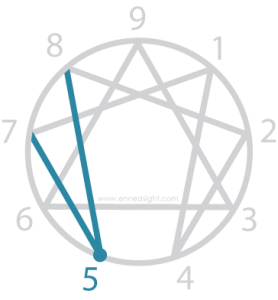 The Observer’s attention is watchful for potential intrusions, which would pull them away from the comfort they experience in the world of ideas. Five’s find protection and security in intellectual pursuits, avoiding the potential instability of their own feelings and needs or those of others. They will explore an area of interest thoroughly, hoping to gain enough information and competence to take into the world. There is a kind of avarice or holding back of their own energy as they perceive they have a limited amount of energetic resources, desiring to conserve what they have.
The Observer’s attention is watchful for potential intrusions, which would pull them away from the comfort they experience in the world of ideas. Five’s find protection and security in intellectual pursuits, avoiding the potential instability of their own feelings and needs or those of others. They will explore an area of interest thoroughly, hoping to gain enough information and competence to take into the world. There is a kind of avarice or holding back of their own energy as they perceive they have a limited amount of energetic resources, desiring to conserve what they have.
Psychological Health: Able to be both engaged in life, staying present to their and others inner emotional and instinctual needs, while still using their skill at observing.
Spiritual Evolution: Able to connect to the vast resources and wisdom inherent in their embodied deeper Self and feel nourished by that.
Relationships: Moving from the tendency to mentalize relationships due to a fear of feeling, they are able to stay present and share from an emotional level, finding deeper connections with others.
Type Six, The Loyal Skeptic:
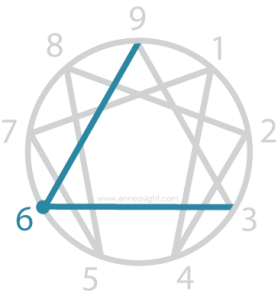 The Loyal Skeptic’s attention is drawn to potential danger or what could go terribly wrong in a situation. In an effort to find security and certainty, and assuage doubt, it seems to make sense to look for what might threaten that. Unfortunately, looking at what we want to avoid, fills our world with that ”“ in this case, the world can look very scary. The Six has a powerful mind that needs to be mastered or it’s run by fear. Understanding that it’s the scary stories their own minds create that manifest anxiety they feel and then project on the world is either a relief or equally terrifying. It’s not that the world can’t be scary, it’s just not that scary or that unsupportive.
The Loyal Skeptic’s attention is drawn to potential danger or what could go terribly wrong in a situation. In an effort to find security and certainty, and assuage doubt, it seems to make sense to look for what might threaten that. Unfortunately, looking at what we want to avoid, fills our world with that ”“ in this case, the world can look very scary. The Six has a powerful mind that needs to be mastered or it’s run by fear. Understanding that it’s the scary stories their own minds create that manifest anxiety they feel and then project on the world is either a relief or equally terrifying. It’s not that the world can’t be scary, it’s just not that scary or that unsupportive.
Psychological Health: begin to relate directly to the fear in themselves, in their bodies, gaining greater trust in themselves and others.
Spiritual Evolution: discover there is something more to rely on than their “big brains” to find security, they develop an exquisite curiosity about their inner experience and move toward life with faith and courage.
Relationships: manifesting loyalty is not a problem, but trust is slow to build and small problems can activate doubt, yet through greater awareness there can be a deep caring and commitment to conscious evolution in relationships.
Type Seven, The Epicure:
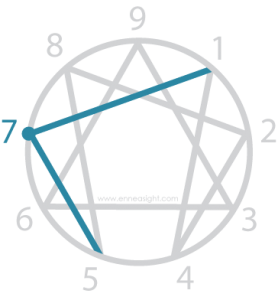 The Epicure’s attention gravitates to interesting and fascinating possibilities and ideals, people, events and situations. In an effort to escape the lower sides of life, like the limitations or pain imposed by living in the world, the Seven attempts to rise above, finding the silver lining in many of life’s sufferings. There are so many pleasures that can be had if one just keeps reaching! Surely the Seven can avoid the cloak of dark emotions”¦.All this reaching for the next potential pleasure or ideal, leads to a kind of gluttony where one misses the riches of a full experience, which includes the depths of our experiences even if painful.
The Epicure’s attention gravitates to interesting and fascinating possibilities and ideals, people, events and situations. In an effort to escape the lower sides of life, like the limitations or pain imposed by living in the world, the Seven attempts to rise above, finding the silver lining in many of life’s sufferings. There are so many pleasures that can be had if one just keeps reaching! Surely the Seven can avoid the cloak of dark emotions”¦.All this reaching for the next potential pleasure or ideal, leads to a kind of gluttony where one misses the riches of a full experience, which includes the depths of our experiences even if painful.
Psychological Health: learns to move through the anxiety that lies below all that activity finding the full rainbow of feelings as well as the calm that resides on the other side.
Spiritual Evolution: brings focus and presence in alignment with their tremendous energy thereby staying with their experiences, following the unfolding of life through ups and downs, and manifesting their visions.
Relationships: finding it’s possible to stay with their own difficult emotions, they are then able to remain present with their others during hard as well as good times.
The types related to the Body Triad (8, 9, 1) are motivated primarily to fill the need for worth, congruence, comfort or belonging.
Type Eight, The Protector:
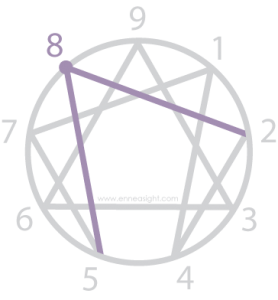
The Protector’s attention is magnetized to issues of power and control. Having control or being the leader in a situation hides the Eight’s vulnerability and fear about feeling controlled. The Eight gains protection, and hopefully respect, by being strong while safeguarding issues of justice. The Protector sits on a volcano of energy, which has the ability to overflow in any moment or simply simmer below the surface. In any case, the Eight is familiar and therefore comfortable with their energy and anger, and can be confused that others are not. An Eight I know once said, “shoot first, ask questions later.” While we may love to follow our Eights in situations that frighten us, they often don’t know the impact of their big energy, often called lust in the Enneagram, which can overwhelm others.
Psychological Health: recognize the denial and cost of their hiding their vulnerability and begin to open to their tremendous capacity for empathy and compassion.
Spiritual Evolution: able to regulate their intense energy, use their power appropriately, and open to the truth in other perspectives.
Relationships: calming down the instinct to take charge and opening to the possibility of trusting another, the Eight can begin to share power in relationships that are built on mutual respect.
Type Nine, The Mediator:
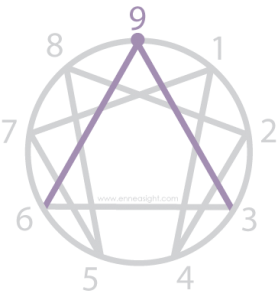
The Mediator’s attention is filled with other people’s agendas, needs and opinions. It feels like their job is to keep the peace, so it’s best to avoid whatever threatens that, including personal viewpoints, feelings, and especially WANTS. They are hypersensitive to discomfort and can use distraction, overwork or even dissociation to cope with it, forgetting themselves entirely. The Mediator is also extremely empathic which can be both a gift and a curse. It usually just seems easier to simply go along with what others want, which they can often detect. Over time, their desires can feel inaccessible. It’s like a wall of fog that appears when the spotlight is on them obscuring their feelings and wants. Unfortunately, all the peace they are attempting to create “out there” can leave them often in a knot of internal discomfort. Part of them wants to be noticed and valued for their contributions. Yet to do this overtly seems dangerous as it could create conflict or leave them estranged somehow. It just seems safer to be invisible.
Psychological Health:begin to center more fully on their inner self, discovering the richness of deeper relationships in which they more fully participate, and that they still belong.
Spiritual Evolution: able to recognize that the sweetness of life includes them, that they can take action based on their own agendas and desires, and become grounded in their own bodies.
Relationships: learning to relate to themselves as compassionately as their partner, they can set healthy boundaries, allowing them to stay attuned to their own opinions, priorities, and feelings.
Type One, The Perfectionist:
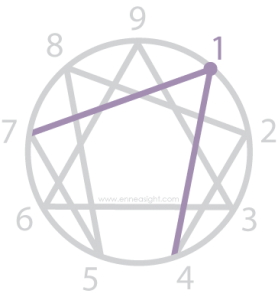
The Perfectionist’s attention is focused on what needs correcting. In an attempt to be a good, have worth and value, they work very hard to do the right thing. Due to this habit of attention, they can often seem judgmental or critical of others, but no more so than they are to themselves. The One feels like they are trying to point out the right path because they care, but their vigilance to the “right way” as they see it can feel frustrating to others and leave them feeling resentful. The Perfectionist can also have a difficult time allowing themselves to experience their feelings or needs, which can be bad or even wrong. How can I be good if I’m angry? Making a mistake is definitely wrong. Highly principled and often part of social and political causes, they can sublimate their anger into righteous indignation, which feels much more acceptable because it’s for a good reason.
Psychological Health: able to relate to the dark and light aspects of their personality, learn to relax and manifest patience and compassion for themselves.
Spiritual Evolution: able to see the perfection inherent in manifestation, they can take action for the good without aggression or suppression, thereby experiencing serenity.
Relationships: moving from rejection of bad qualities in self and other to be able to love and be loved even with imperfections.

